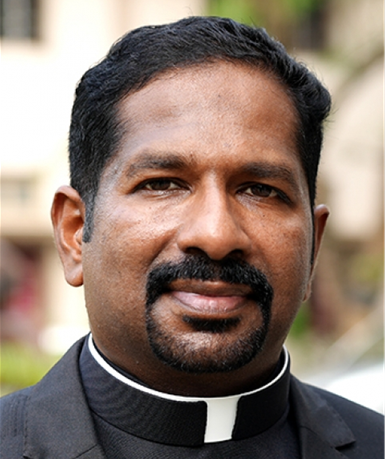.jpg)
Unseen Blessings and Graces - Family Reflection Video
Learn more about our faith | Holy lives of inspiration
In 8 AD, Ovid, a Roman author, penned a story about Greek Gods Zeus and Hermes, who took on human form and visited a thousand homes in Phrygia seeking hospitality. Zeus and Hermes disguised themselves as human travelers in Phrygia. They go from house to house searching for food and lodging but are refused a thousand times.
Finally, they reach the cottage of old Baucis and Philemon, who show them their finest hospitality despite their poverty. At one point, the old couple is astonished to see the wine replenished as they prepare the finest meal they can muster. As they realize their guests are divine, they attempt to sacrifice their only goose, but Zeus and Hermes intervene. The two gods then pronounce judgment on the region for its inhospitality but make an exception for Baucis and Philemon. They lead the couple to a nearby mountain and watch while the entire countryside is flooded and their house is transformed into a magnificent temple.
The two gods then offer to grant Philemon and Baucis whatever they want, and the couple asks to serve as temple priests and have their lives end simultaneously. Years later, when the two die, they are immediately transformed into two sacred trees: an Oak and a Linden tree.
This was the historical context when Paul and Barnabas arrived in Lycaonia 40 years later. The locals understandably believed that they were Greek gods. Barnabas and Paul's identifications as Zeus and Hermes may reveal something about their appearances since Zeus was frequently portrayed as a big, bearded man, while Hermes was depicted as his younger, smaller helper. Moreover, Paul was the main speaker, so the locals viewed him as Hermes - the messenger of Zeus.
When the crowds see Paul heal a cripple, they shout that the gods have revisited them. After all, they certainly don't want to meet with the fate that the inhospitable villagers did in the story of Philemon and Baucis! But while Ovid's visitors reveal their divine nature and accept hospitality, our two apostles reveal their mortal nature and refuse hospitality.
Perhaps that was the best the people of Lycaonia could do at that time; they interpreted this event based on the stories they knew. Paul and Barnabas' evangelistic work was yet to produce faith, repentance, and obedience. What sort of redemptive, sacrificial love of Jesus could they understand without dismantling pagan mythology? Despite their efforts to clarify, Paul and Barnabas "scarcely restrained" the crowds.
Compare your actions and attitudes with Paul's in Lystra. Wouldn't it have been easy for Paul to sign a few autographs and enjoy being the center of attention for a while? What if people didn't realize the miraculous power came from God and not him? Paul's attitude was quite different. He wanted people to understand that the God of the Bible should be thanked and worshipped.
Paul explained that our God made everything, so He is mighty. Furthermore, God is very loving. Although the people of Lystra had not thanked Him for a single time, He had sent them rain and good crops for years. Our God is good all the time. It's bad enough if you forget to send Mom a card on Mother's Day, but how will she feel if you write a card, buy flowers, and take someone else's mom out for dinner instead? The people of Lystra slighted God daily by giving thanks and honor to idols instead of the true God for centuries.
Well, we haven't treated God that way, have we? Think of the satanic conference in Boston the previous weekend. To whom did they give honor and praise? Although we may never have bowed down to a statue believing it was a god, we have nevertheless struggled to live the First Article of the Creed. While we confess that there is one God, we act as if we are that God. People and situations often get the credit, downplaying God's unseen blessings and graces. Do we take the credit that's due to God?
Like Paul and Barnabas, may we always realize that all glory should be given to God and not to works of human hands. We are not the center of the universe. The Psalmist puts it well: Not to us, O Lord, but to Your name give the glory.
- Father Boby's inspirational homily was recorded live this morning during Mass at the Father Peyton Center. Please view the video on our Facebook page. (You don't need a Facebook account to view.)
- To view Rosary prayer and Mass streaming live, please visit our Facebook page at 11:30 am Eastern, Monday – Friday. Please invite your loved ones to join us too! (You don't need a Facebook account to view.)
About Father Boby John, C.S.C.
Father Boby John, C.S.C., ordained a priest in the Congregation of Holy Cross in 2008, worked as a pastor and an educator with tribal populations in Northeast India for thirteen years. Originally from Kerala, India, Father Boby grew up with his parents and three siblings. He is a dedicated and detailed educationist with a Master's degree in Educational Management and is pursuing a PhD in Educational Leadership. He is currently working as the Co-Director of Family Rosary, USA, and as the chaplain at the world headquarters of Holy Cross Family Ministries, North Easton, Massachusetts.

